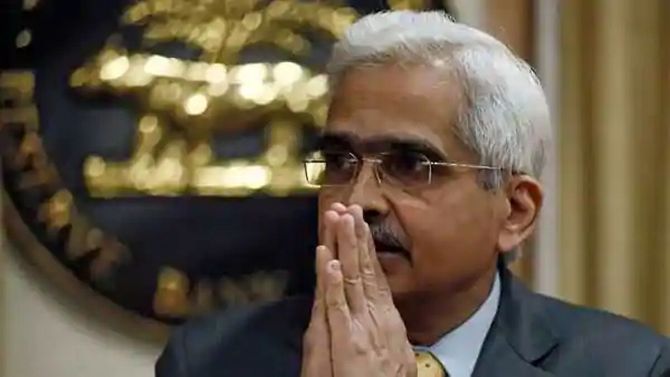Fitch Solutions sees RBI keeping benchmark interest rates unchanged during the fiscal to March 2022 following its decision to buy Rs 1 lakh crore of government bonds.

"We had initially expected another policy rate cut to arrest the rise in government bond yields since the Union Budget announcement in February.
"However, having an explicit bond purchase guidance from the RBI following the announcement of the G-SAP will also achieve a similar effect, if not even be more effective than a rate cut on capping the increase in bond yields," it said in a note.
The Reserve Bank of India (RBI) held its policy repurchase (repo) rate unchanged at 4 per cent at its monetary policy meeting on April 7.
In addition, the RBI announced a secondary market government securities acquisition programme (G-SAP 1.0), committing to buy up to Rs 1 lakh crore worth of government bonds in April-June, taking another step towards formalising quantitative easing.
"As such, we at Fitch Solutions have revised our forecast for the RBI to keep its policy repurchase (repo) rate on hold at 4 per cent over the course of FY22 (April 2021 – March 2022), from our view of a 25 basis point cut previously," it said.
Fitch Solutions also revised its inflation rate forecast to an average of 5 per cent in FY22, up from 4.6 per cent previously, due to elevated inflationary pressures.
The elevated inflation "underscores our expectation for the RBI to keep its policy rate on hold", it said.
Government bond yields have trended higher since the Union Budget announcement in February, given the government's substantial market borrowing plan of Rs 14.3 lakh crore.
The RBI had already been buying government bonds in the secondary market and held Rs 3.1 lakh crore worth of bonds in FY21.
"However, the announcement of the G-SAP marked the first time the RBI had committed to an explicit quantity of bond purchase and we believe that this enhances the certainty of the bond market on the evolution path of bond yields over the coming months.
"This will complement the existing open market operations and the 'Operation Twist' the central bank conducts to cap increases in bond yields," it said.
'Operation Twist' refers to the simultaneous purchase of long-end bonds and sale of short-end bonds to cap long-end yields.
The monetary policy committee (MPC) has maintained its stance to keep monetary policy accommodative for as long as necessary to sustain growth on a durable basis and continue to mitigate the impact of COVID-19 on the economy, while ensuring that inflation remains within the target range of 4 per cent, plus or minus 2 per cent.
On economic growth, the RBI expects robust urban demand on the back of a normalisation of economic activity.
And, for high public capital expenditure allocation in FY22, it expects the expanded production-linked incentives scheme and rising capacity utilisation to provide strong support to investment demand and exports.
The central bank retained its 10.5 per cent real GDP growth projection for FY22.
Fitch Solutions said persistent headwinds to India's economic recovery will necessitate a continued accommodative monetary policy stance by the RBI.
"India has entered a second wave of COVID-19 infections in April despite a broadening vaccination roll-out, with renewed lockdowns implemented in the hardest-hit state of Maharashtra and separately also Delhi to manage the rising numbers of cases.
"Given that these two states account for a combined 17 per cent of GDP, with Maharashtra contributing about 13 per cent, renewed curbs on economic activity and movement will weigh on the pace of India's ongoing recovery," it said.
Fitch Solutions expected the ongoing recovery to be driven by private consumption and gross fixed capital formation.
"However, we have pegged back our forecast for real GDP growth at 9.5 per cent in FY22, putting us below the IMF's (International Monetary Fund) 12.5 per cent," it said.











 © 2025
© 2025